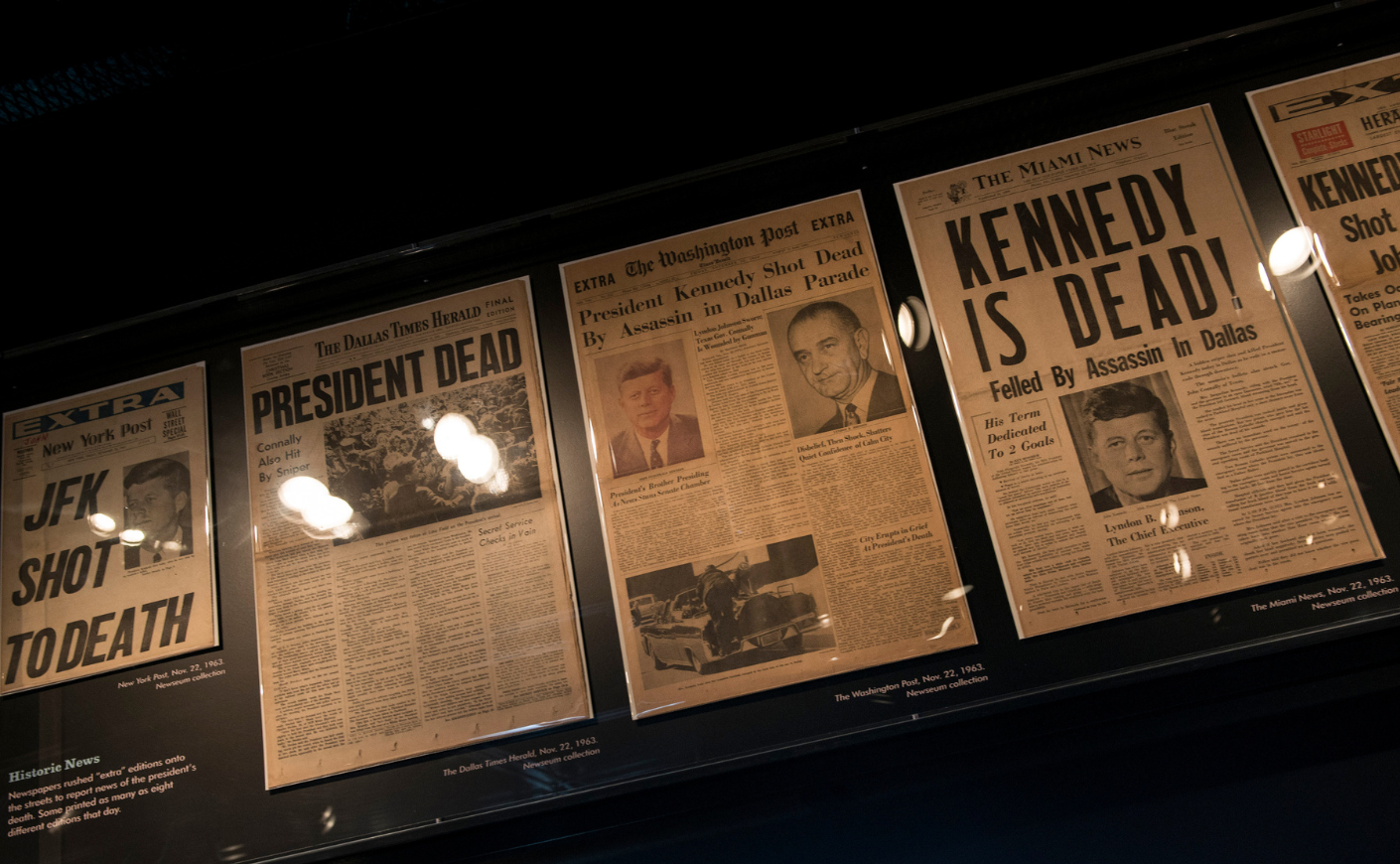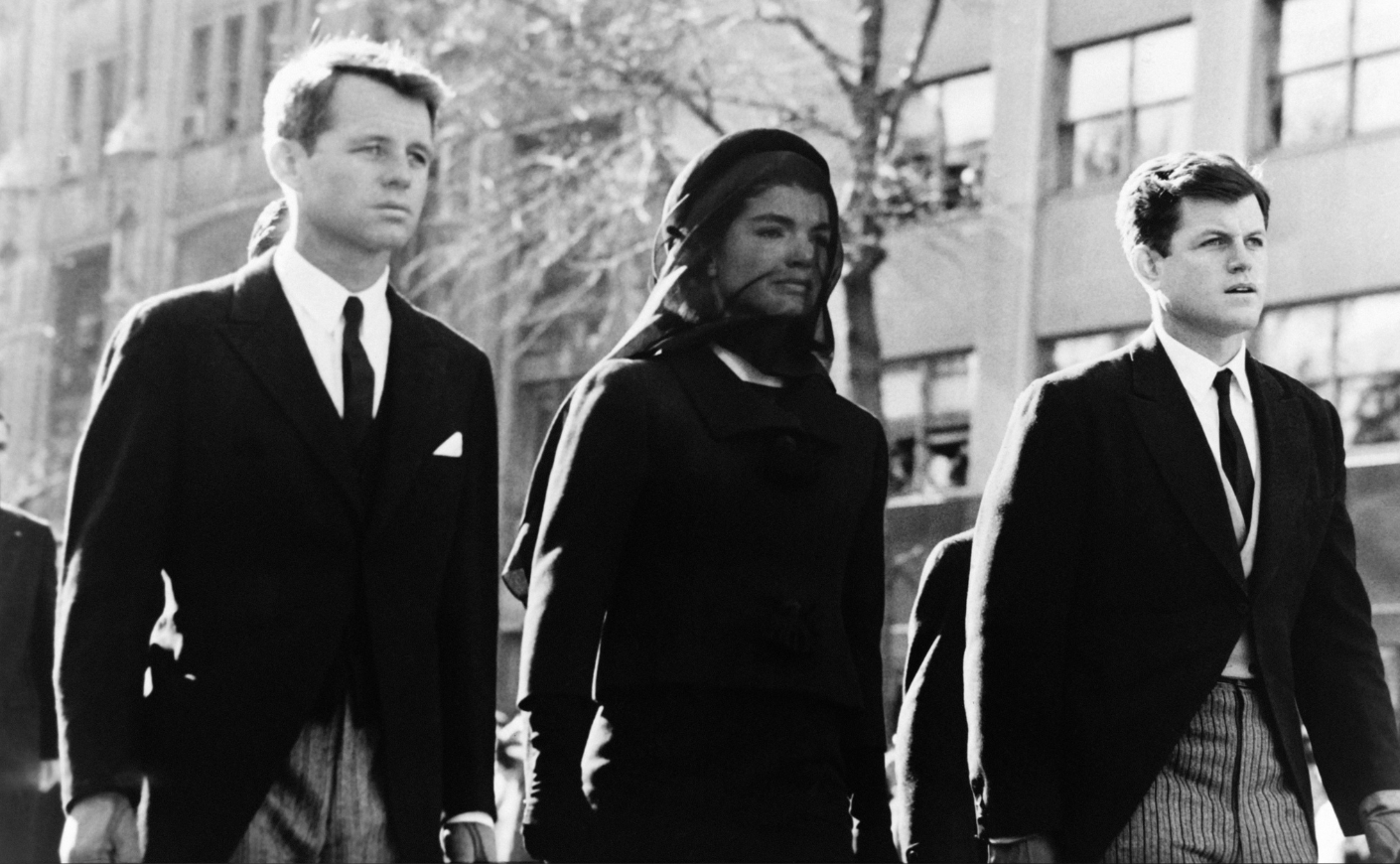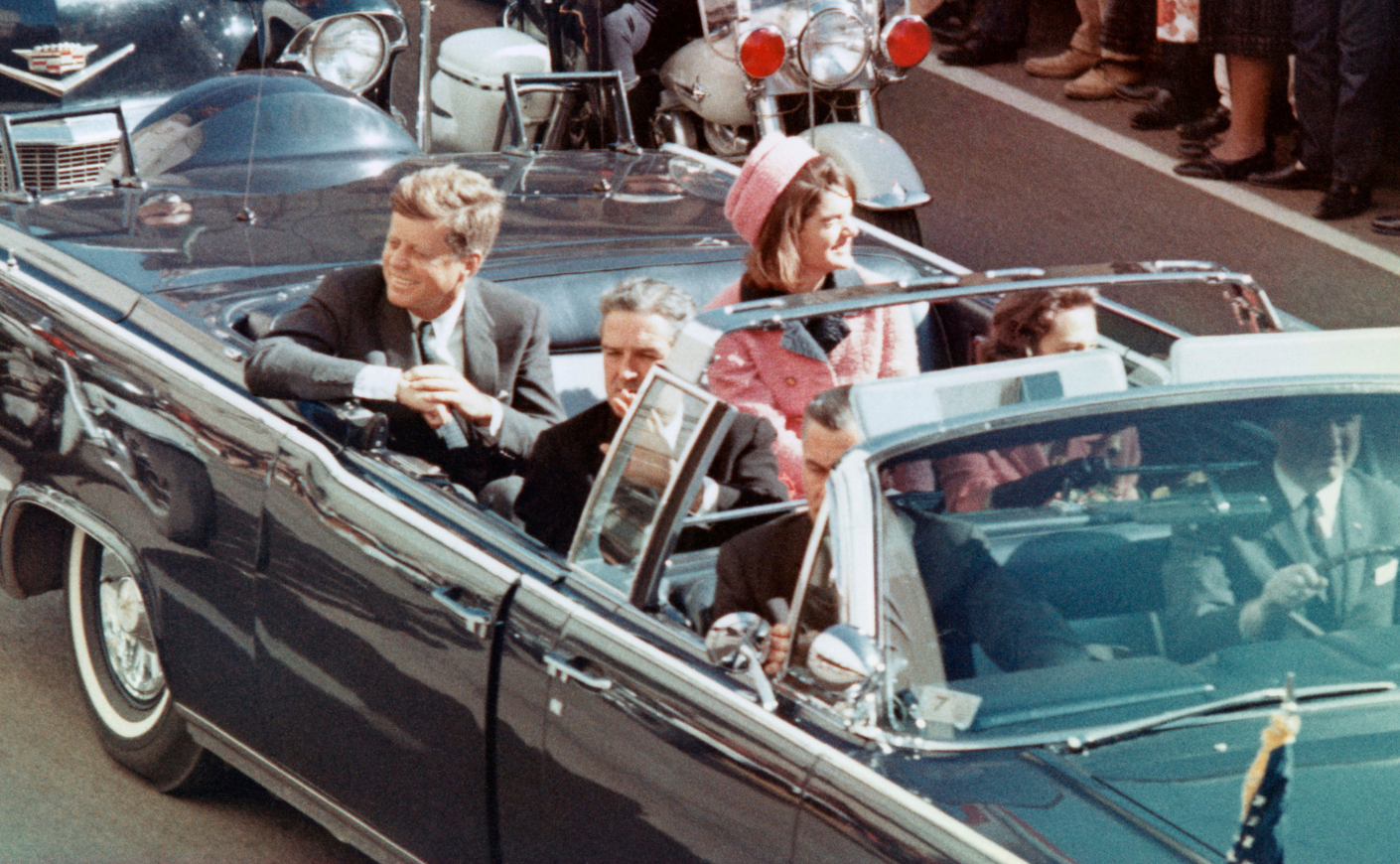John F. Kennedy occupied the White House for only 1,036 days between 1961 and 1963, but he’s such a towering figure that he looms larger in the American consciousness than many presidents who served two full terms.
The biggest reason for that is what happened on Nov. 22, 1963 — 60 years ago today. During a high-profile trip to Dallas, Kennedy was murdered in cold blood by an assassin who wielded a rifle from the window of a nearby building. In the open-air presidential limousine, the president was a sitting duck for the shots fired by Lee Harvey Oswald, a man who had once been described by a psychiatrist as “emotionally quite disturbed.” The blasts left JFK slumped over in the lap of his wife, Jacqueline Kennedy, who was later photographed wearing splatters of her husband’s blood on her iconic pink suit. The horrific events were captured in video footage that became known as the Zapruder Film, perhaps one of the most scrutinized pieces of media of the 20th Century.
While JFK was rushed to the hospital where he’d be pronounced dead, Oswald hid in a movie theater, where he was quickly found and arrested. But before he could be tried in court, he was also killed two days later, when he was shot while exiting police headquarters by nightclub owner Jack Ruby, who was apparently taking revenge for JFK’s death.

The conventionally accepted wisdom — and the determination of the Warren Commission, which formally investigated the assassination — is that Oswald acted alone. But that’s been cast into doubt many times: Oswald himself claimed to be a “patsy” in the incident, and obsessive scrutiny of the details has led to conspiracy theories about what “really” happened. (In 1991, director Oliver Stone had a box-office smash with his critically acclaimed film JFK, which cast Kevin Costner as an attorney who believes there’s more to the story.)
Whether or not you’re willing to go down the rabbit hole of conspiracy, there’s no denying the cultural and political impact of a president’s shocking murder. To understand more about what happened and what it all means, we called up Mark K. Updegrove, author of Incomparable Grace: JFK in the Presidency and president and CEO of the LBJ Foundation. An edited version of our illuminating conversation is below.
Katie Couric Media: A lot of the coverage around this 60th anniversary has described JFK’s death as the moment that America “lost its innocence.” How would you characterize the way the country changed when Kennedy died?
Mark K. Updegrove: Well, I certainly wouldn’t call it America losing its innocence — no country involved in the slaughter of Indigenous people and created through rebellion was ever innocent. But it was a dark day in American history. There are days that, to quote Franklin Roosevelt after the bombing of Pearl Harbor, live in infamy — and that was certainly one of them, just like 9/11 or January 6. When we look back, we all remember where we were and what we were thinking.
The tragedy was exacerbated by the fact that John F. Kennedy had been the youngest president-elect in the history of our country, at the age of 43. He exuded youth, vitality, and promise. His presidency began relatively inauspiciously — he stumbled out of the gate with the Bay of Pigs fiasco and a disastrous summit with Nikita Khrushchev — but when he died in 1963, nobody else matched Kennedy’s stature on the world stage. It was not only his death by an assassin’s bullet, which is tragic enough, but it was also the end of the life of somebody who had achieved admirable growth in his presidency in a short period.
The idea of the liberal utopia of “Camelot” crystalized quickly after JFK’s death, but the creation of that myth was very much by design. How did it manifest following the assassination?
To some degree, it was Jackie Kennedy’s creation. She wanted to see her husband become a great president, and she began spinning the story of Camelot shortly after this death. In fact, we didn’t use the word Camelot but for Jackie’s retelling of her husband’s life, when she talked about him playing Camelot [the soundtrack of the 1960 musical]. Whether or not that’s true doesn’t matter. It fit the image that we had in the wake of his assassination, when we wanted to hear wonderful things about our slain president. Then she staged his funeral using Abraham Lincoln’s funeral as a template, which shows you she had an eye on history.

The legend of Jack Kennedy grows during the course of the 1960s, including the notion that he would have had the prudence and the wisdom to withdraw troops from Vietnam before it became the quagmire that it did under Lyndon Johnson. There was no evidence of that whatsoever, but it was spun by Kennedy acolytes afterward to advance the political career of Bobby Kennedy, the heir apparent to the Kennedy dynasty. Bobby had very much supported the war — as had his brother — prior to the assassination, but as the war advanced, that changed, and Bobby became an anti-war candidate for president. So there are things like that, which are spun to enhance the mythology around John F. Kennedy for the sake of history and to aid the career of Bobby Kennedy, who had designs on the presidency himself.
Sixty years later, JFK’s death is still treated as a mystery rife with conspiracy. Why is there still such intrigue and doubt about what happened?
Fascination with conspiracy is part of human nature. You can see it today: It explains why Trump remains so popular, because I think there are many Americans who buy into this notion that there is a “deep state” out to get Donald Trump, as ludicrous as that seems. We are gullible when it comes to conspiracy — we want some sort of deeper meaning around something, or a more complex explanation.
But when we patch together these conspiracy theories, we lose sight of who Lee Harvey Oswald was. He was demented. He was violent. He had a sense of personal destiny of achieving either fame or infamy to make his mark on the world. He was a Marxist. A Communist sympathizer. He was an expert marksman. Most importantly, he had already attempted the assassination of a government official, a general who he narrowly missed killing. All the pieces of the puzzle fit for Oswald. Whether it was just him or he was involved with someone else, I can’t say definitively. I don’t think we’ll ever know. But no evidence has come forth that is more reasonable than the lone gunman theory that the Warren Commission concluded was the only thing it could stand behind.

There have been plenty of “new revelations” put forth in the media around this 60th anniversary. One of them is a documentary in which doctors who treated JFK that day question whether the president was shot only from behind, as the Warren Commission said, or from the front as well. Does something like that resonate with you?
You know, we’ve had two generations to sort this out. I’m not sure why this stuff is coming forth now, or why it would compel us to reassess the whole case, which has been so scrutinized. It’s hard for me to be moved by new evidence unless it’s conclusive or definitive. There are certain conspiracy theories that end up being true, but people have a hard time keeping a secret. Human nature is such that we either want to be self-aggrandizing by telling people we know something, or we are repentant about doing something that we later feel guilty about, or we want a place in history. There are so many reasons why people don’t keep secrets like that — and think about how many people would have had to keep this secret about the assassination of the president of the United States.
This assassination would’ve been an earth-shattering event no matter what, but it’s even more gripping because the first lady was also in the car at the time. Why did she join the trip to Texas, and what does she add to this story?
Jackie Kennedy is a very significant aspect of the assassination. This is a woman who didn’t spend a great deal of time at the White House — she was frequently on Cape Cod or out in the Virginia countryside at a house the Kennedys rented — and she didn’t travel frequently with her husband. So her presence speaks volumes about the importance of this trip, which was meant to bolster Kennedy’s support in Texas, a very important state electorally, and to raise money [for the 1964 presidential campaign]. Kennedy was promised by Texas Gov. John Connally that if he went to Texas, he could raise about $1 million for the reelection war chest.

So Jackie accompanied him, and given the public’s fascination with her, the visit became much bigger. She knew that. You can see her playing to the crowds throughout the trip. She understood the significance, and she was proud of the contribution she was making to her husband’s success in the presidency. And then she was there to watch as he left this earth, which makes this a particularly harrowing chapter of American history.
Your book included fascinating insight about JFK’s infidelity, but by many accounts, the Kennedys’ marriage was in a very happy place leading up to that fateful day. Where did they stand as a couple in November 1963?
They had come together throughout the course of the presidency. She stepped up to the role of first lady in so many respects, and Kennedy saw the effort she was making and the allure that she held among Americans and throughout the world. Probably the best example is their trip to France.
That’s when the president famously described himself as “the man who accompanied Jacqueline Kennedy to Paris.”
Exactly. She’d also beguiled Nikita Khrushchev and other world leaders, and Americans were fascinated with everything that she did. She was enhancing what we would now call the Camelot image. She becomes extraordinarily important, and he sees that. They were becoming closer and closer, and Jackie Kennedy called those few years they spent in the White House their happiest years together, which makes sense if you see the trajectory of all the trials they went through, not only in his presidency, but personally as well.
We’ve all seen the iconic photo of Lyndon B. Johnson standing next to Jackie as he’s inaugurated on Air Force One after the assassination. What was that like for the people on the plane?
Like everyone in America, they were in shock. It was an incredibly sad, somber day. I think Johnson was right to take the oath of office in Dallas. He was right to ask Jacqueline Kennedy if she wanted to witness the swearing-in. And he was right to wait for the body of John F. Kennedy to be loaded into Air Force One before returning to Washington. This is someone who had an intuitive sense of power. In many ways, Johnson was the right man at the right time, but you can see on the countenance of the people on the plane what a tragic moment that was. No man wants to take the presidency in that fashion, as an accidental president.

How does JFK continue to influence modern politics today?
There are so many ways. He exuded a youthful dynamism — it was called “vigor” at the time, or, in his Boston accent, “vigah.” We’re a young nation, so we celebrate youth more than other cultures, and Kennedy embodied that. He was also a brilliant communicator who got us thinking about something beyond ourselves and giving back to our country. He embodied this notion of service over self, not only in the “ask not what your country can do for you” rhetoric, but in many of the things he did over the course of his presidency.
What do you think a second Kennedy term might have been like if he’d lived to win one?
There’s simply no way of knowing. But if you look at what Lyndon Johnson did, relative to what Kennedy might have done, I think it’s fair to say that Kennedy took a more pragmatic approach to foreign affairs and steadfastly avoided war. Most famously, there’s the Cuban Missile Crisis, where Kennedy kept his head and avoided what would almost surely have been a nuclear holocaust if tensions had escalated. So you could make the case for why Kennedy might have taken a different turn in Vietnam. By the same token, two months before his assassination, he’s telling all three news networks that he believes in the domino theory and he believes that we need to continue to aid the South Vietnamese in their effort to stave off communist insurgency.
If you look at the domestic legacy, Kennedy campaigned vigorously for Medicare, including with a huge rally at Madison Square Garden, and he couldn’t get it through. He proposed the Civil Rights Act of 1963, but didn’t put the weight of the presidency or any legislative muscle into getting it passed. Would we have had civil rights as quickly as we did with Lyndon Johnson? Would he have put the prestige of the presidency behind it? There’s no way of knowing that, but we know that Lyndon Johnson did, and it was truly transformational. Johnson also got through federal aid for education, the most dramatic immigration reform in the history of the country, voting rights, clean air, clean water, highway beautification, the creation of Head Start, and on and on.
Johnson moved forward a remarkable slate of legislation that essentially created the foundation for modern America. I don’t see Kennedy becoming a legislative president in order to make that kind of transformational change, so it’s a mixed bag. But at the end of the day, it’s a fool’s errand to speculate, because no one can know what might have been.









